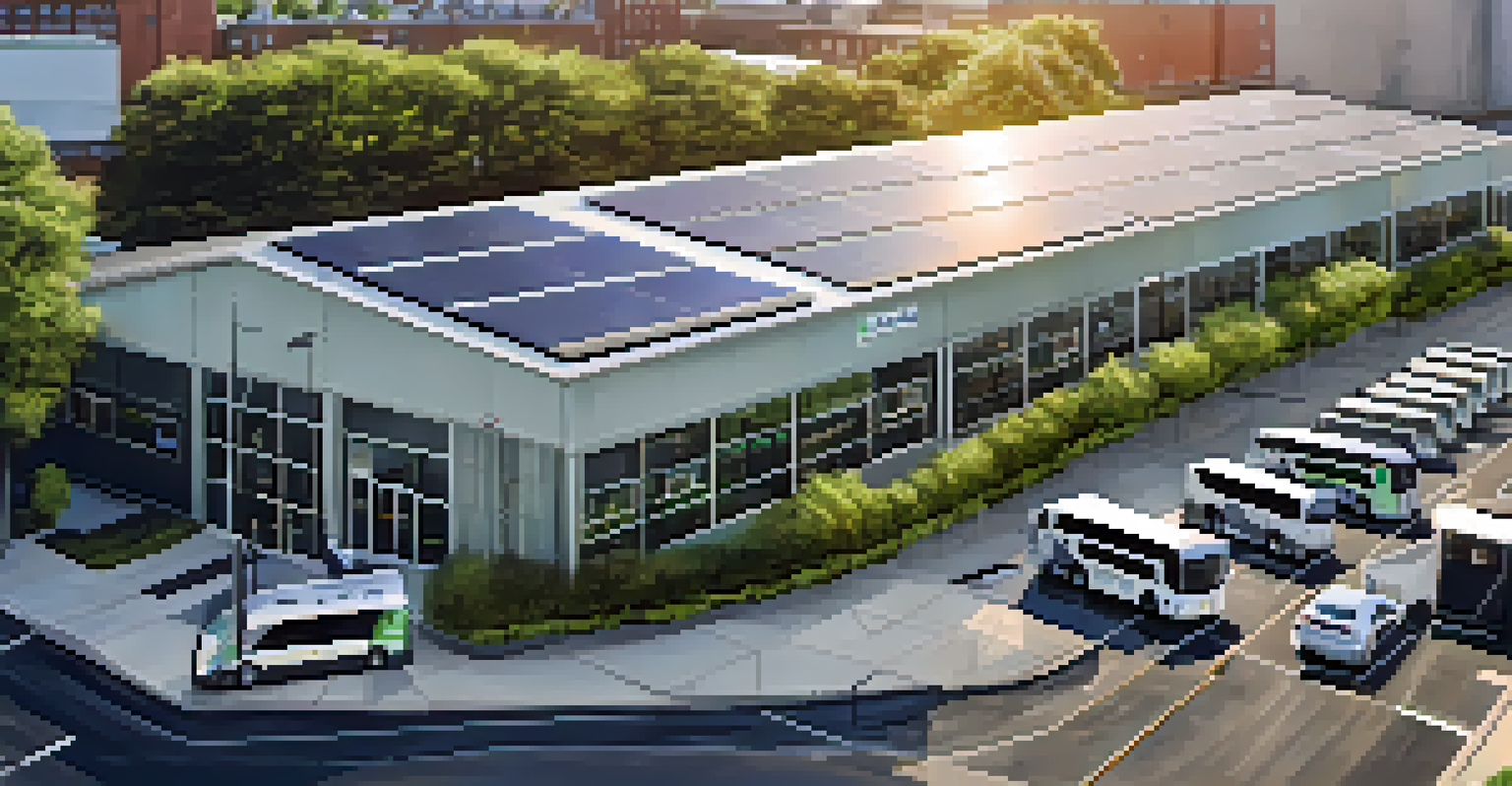Exploring Jersey City's Electric Bus Initiative for Eco-Friendly Transit

Understanding Jersey City's Electric Bus Initiative
Jersey City has embarked on an ambitious electric bus initiative aimed at reducing carbon emissions and promoting eco-friendly transit. This project is part of a larger movement toward sustainable transport solutions in urban areas. By integrating electric buses into their public transit system, Jersey City is taking a significant step towards a greener future.
The electric bus initiative in Jersey City is not just a transportation upgrade; it's a commitment to building a healthier, more sustainable community for generations to come.
The initiative aligns with broader goals of improving air quality and reducing reliance on fossil fuels. Electric buses produce zero tailpipe emissions, making them a cleaner alternative to traditional diesel buses. As cities grapple with pollution and climate change, Jersey City's approach serves as a model for other urban centers looking to make a change.
In this article, we will explore various facets of the electric bus initiative, including its benefits, implementation challenges, and the overall impact on the community. Understanding these components is crucial for appreciating the significance of this project for both residents and the environment.
Benefits of Electric Buses for the Environment
One of the most compelling advantages of electric buses is their positive impact on the environment. Unlike traditional buses, electric models do not emit harmful pollutants like nitrogen oxides or particulate matter, which contribute to urban smog and respiratory issues. This shift not only benefits public health but also enhances the overall quality of life in Jersey City.

Moreover, electric buses can significantly reduce greenhouse gas emissions when powered by renewable energy sources. As Jersey City continues to invest in solar and wind energy, the sustainability of its electric bus fleet will only improve. This transition represents a crucial step towards meeting climate goals and combating global warming.
Electric Buses Boost Eco-Friendliness
Jersey City's electric bus initiative significantly reduces carbon emissions and promotes cleaner air quality for residents.
Additionally, electric buses operate more quietly than their diesel counterparts, reducing noise pollution in busy urban areas. This quieter operation contributes to a more pleasant environment for pedestrians and residents alike, making the city a more enjoyable place to live and work.
Cost Savings and Economic Impact of Electric Buses
While the initial investment in electric buses may be higher, the long-term financial benefits are undeniable. Electric buses typically have lower operating costs, mainly due to decreased fuel expenses and reduced maintenance needs. This can lead to substantial savings for public transit agencies over time, allowing them to allocate funds to other important projects.
Electric buses represent a crucial step towards meeting climate goals and combating global warming.
In addition to savings on operational costs, the electric bus initiative can stimulate job growth in Jersey City. As the demand for electric buses increases, so does the need for skilled workers to maintain and operate these vehicles. This creates new job opportunities in areas like technology, engineering, and sustainable energy.
Furthermore, the presence of electric buses can attract businesses and residents who are environmentally conscious. A commitment to sustainability can enhance Jersey City's reputation as a progressive and attractive place to live, work, and invest, fostering economic growth in the community.
Challenges Faced in Implementing Electric Buses
Despite the numerous advantages, implementing electric buses does come with its own set of challenges. One of the primary hurdles is the upfront cost of purchasing electric buses and installing the necessary charging infrastructure. While grants and funding can help, budget constraints can still pose significant obstacles for many transit agencies.
Another challenge lies in the range and performance of electric buses. While technology is constantly improving, ensuring that electric buses can cover the required distances without frequent charging is crucial. Transit agencies must carefully plan routes and charging schedules to maintain efficiency and reliability.
Economic Growth Through Sustainability
The initiative not only lowers operational costs but also creates job opportunities in technology and sustainable energy sectors.
Lastly, public perception and acceptance of electric buses can also be a hurdle. Some riders may be hesitant to embrace new technology, fearing that electric buses may not be as reliable as traditional buses. Education and outreach efforts will be essential to inform the public about the benefits and reliability of electric transportation.
Community Engagement in the Electric Bus Initiative
Community involvement plays a vital role in the success of Jersey City's electric bus initiative. Engaging residents in discussions about the benefits of electric buses can help build support for the project. Town halls, workshops, and social media campaigns can serve as platforms to share information and gather feedback.
Additionally, partnerships with local organizations can enhance community engagement. By collaborating with schools, environmental groups, and businesses, Jersey City can foster a sense of collective responsibility towards sustainable transit. These partnerships can also provide valuable insights into community needs and preferences.
Ultimately, creating a sense of ownership among residents can lead to greater acceptance and usage of electric buses. When the community feels invested in the project, they are more likely to support it and advocate for the continued expansion of eco-friendly transportation options.
Future Prospects for Jersey City's Transit System
Looking ahead, Jersey City's electric bus initiative sets the stage for exciting developments in the city's transit system. As technology advances, we can expect to see improvements in battery life, charging efficiency, and overall performance of electric buses. This evolution will make them an increasingly viable option for public transportation.
Moreover, Jersey City is positioned to expand its electric fleet further, potentially integrating additional sustainable technologies such as hydrogen fuel cell buses or hybrid models. These advancements could enhance the overall effectiveness of the transit system, providing residents with more options for eco-friendly travel.
Community Engagement is Crucial
Involving residents in discussions and partnerships enhances support and acceptance for the electric bus initiative.
The success of the electric bus initiative could also inspire other cities to follow suit. As more municipalities recognize the benefits of sustainable transit solutions, we may witness a broader shift towards electrification of public transportation, leading to cleaner, greener urban environments across the nation.
Conclusion: A Sustainable Future for Jersey City
In conclusion, Jersey City's electric bus initiative represents a significant leap towards a sustainable future for urban transit. By prioritizing eco-friendly transportation options, the city not only addresses environmental concerns but also enhances the quality of life for its residents. The benefits—ranging from improved air quality to economic growth—are compelling reasons to support this initiative.
While challenges remain, the commitment to overcoming these obstacles through community engagement, strategic partnerships, and technological advancements is promising. Jersey City serves as a beacon of innovation, encouraging other cities to embrace similar initiatives.

As we look to the future, it's clear that the electric bus initiative is more than just a transit upgrade; it's a commitment to building a healthier, more sustainable community for generations to come.